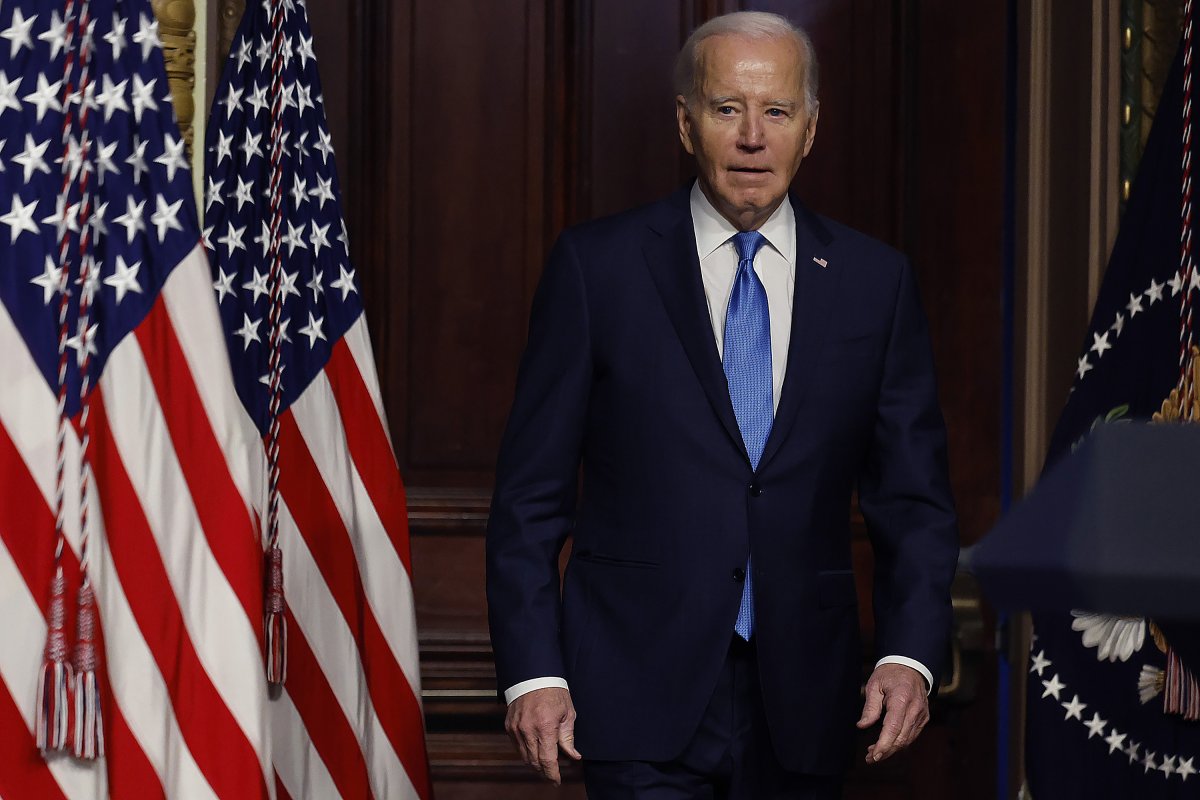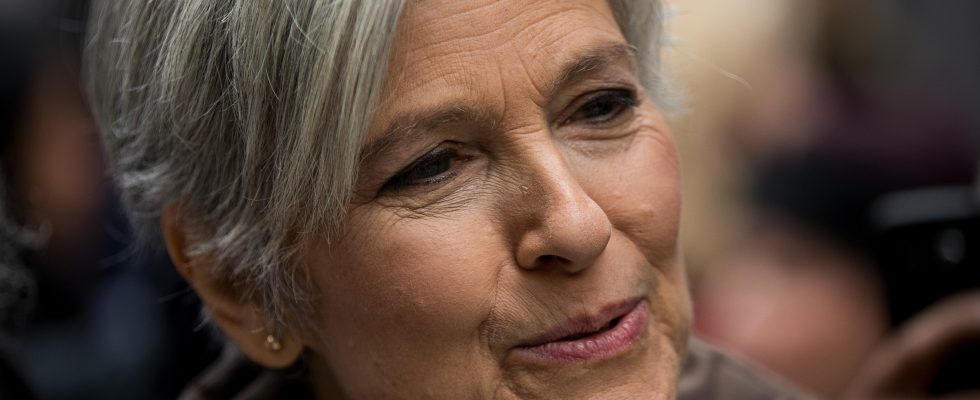Running for president a third time was “absolutely not” something Jill Stein started the year intending to do, she tells Newsweek. But after a “long-standing argument” with Ajamu Baraka, her running mate in 2016, “he won that battle” and in early November she announced her latest bid for the White House.
Despite a perhaps begrudging reentry into the national political debate, the Green Party stalwart says the campaign is already turning out to be “a blast,” and hopes to take the fight to the two mainstream parties in an election that could yet yield a few upsets.
In a wide-ranging interview about her candidacy and the fledgling campaign, Stein says Democratic incumbent and likely nominee Joe Biden is “already losing,” something that she is “already being blamed” for; discusses Cornel West’s abrupt departure from the Green Party race and the “scramble” to fill the space he left; and how her upbringing shaped her views on the Israeli-Palestinian conflict.
A physician by training who studied at Harvard, Stein, 73, explains that she first broke into environmental politics because of concerns over the impact of poor air quality on her then-young children’s health.
Drew Angerer/Getty Images
“One of my kids had asthma, and so I was just very mindful of sources of air pollution that are driving this epidemic of asthma,” she says from her personal study, adding that she “then became very involved as a medical doctor in advocating for cleaning up our sources of air pollution and water pollution, and mercury in the fish supply.”
Demonstrating this by pulling some of the papers on child health she helped translate from her bookcase—which also prominently displays a tome by Ralph Nader, the party’s pick in 1996 and 2000—she adds: “I felt like it was so unjust that I, as a doctor, could read this literature and understand the warning signs, but that they weren’t out there.”
Disenchanted with “a game of influence peddling” among advocates and lawmakers, she got involved in pushing for changes to election law in Massachusetts before being recruited to run as a Green-Rainbow candidate for the state’s gubernatorial race in 2002.
“I entered that race out of absolute desperation, as a mother and an advocate,” Stein recalls. “But I left the race with a whole lot of inspiration, because I discovered that if you’re running as a people-powered candidate, not a corporate-powered candidate…you have really interesting conversations with people and it’s a much more open.”
Democrats ‘Are in Losing Mode Right Now’
When Stein last ran for president, in 2016, and received 1 percent of the popular vote—the party’s best result since Nader—she was blamed for Hillary Clinton’s loss and Donald Trump’s ascension to 45th president, though Green Party activists note they have little effect on the Electoral College.
“We’re already being blamed,” she replies wryly to a question about whether she thinks she could be blamed again if Biden loses. “Biden is already losing; he’s on his way to losing right now. And the problem with the Democrats is that they’re fooling themselves about what’s driving their loss.”
Stein argues that what will spell election misery for the Democrats is a disconnect with voters that means many are either looking elsewhere or will not come out to cast their ballot on Election Day, noting that while she earned more than 1.4 million votes in 2016, Clinton lost 5 percent to 8 percent of Democratic voters to Trump while there were nearly 100 million who didn’t vote at all.
“They are in losing mode right now because they have betrayed their base—that is the problem,” she says. “The number of votes that Greens get is really totally on the margins. The big losses are people who won’t vote at all, or people who have voted Democrat who’ve crossed over.
“They’ve got to blame it on someone else, so that’s why they try and blame us. As far as I’m concerned, these are old white guys whining.”
Newsweek reached out to the Biden campaign via email on Friday for comment.
Stein says that part of her reasoning for running again is the disaffection people are feeling toward mainstream candidates. A Pew Research Center poll of 8,480 adults, conducted between July 10-16 found that only 35 percent of Americans were satisfied with the candidates who had stepped forward, while nearly half wished there were more than two major political parties. Biden’s and Trump’s disapproval ratings currently stand above 50 percent.

Chip Somodevilla/Getty Images
In this apparent electoral malaise, she and others have spied a chance for a breakthrough.
“Two candidates are being rammed down people’s throats right now, who are extraordinarily unpopular, and most people who are voting for them are actually voting against the other candidate that they despise even more,” Stein says.
“So we’re really in a perfect storm for deep political change,” she adds. “The need for change—deep change—has never been more urgent, and the possibility of that change has never loomed so large.”
West ‘Not Accustomed to Being on a Team’
Before Stein entered the race, Cornel West, an academic and civil rights activist, was lined up to be a charismatic standard-bearer for the party in 2024, with Stein as his interim campaign manager, but despite a warm reaction from party members, in October he suddenly declared he was running as an independent.
That left the Green Party without a presumptive nominee and in turmoil as it looked for another recognizable face to fill the gap.
Stein says the party had “no strong candidate before Dr. West,” which was “why we were very excited and delighted when he switched” from the People’s Party. She applauds him for being “a very courageous voice—and it was wonderful to see him in action, just telling it like it is.”
But running for office is a “pressure cooker,” relying on unfamiliar people, she adds, which proved “very challenging,” so “it was no surprise it didn’t work, but we were not planning to fill that gap.”
When asked about what led to West’s departure, Stein says he is “not accustomed to being on a team,” but is rather “a very proud, independent voice, and it’s hard to be an independent voice when you’re working with a political party.”
“If you don’t have a working relationship with the party and the activists, then it feels like their expectations and their demands—you don’t know what to do with them,” she adds. “And I think that was very hard for Dr. West. He just didn’t know how to deal with a whole set of expectations and feedback you get as a candidate.”

DAVID SWANSON/AFP via Getty Images
Given her experience, she suggests “you have to learn your way into that kind of relationship—especially in a presidential campaign when it’s 24/7—and I think that was hard, that was very hard.”
“It was really an experiment, I think on all of our sides, to see if this would work,” Stein adds. “[It] didn’t work out, that really wasn’t a great surprise, but we didn’t find out about that until late in the game.”
When West decided to go his own way, Stein says that top Green Party activists did not want to lose the momentum his fleeting candidacy had brought, nor did they want to lose their hard-won ballot access.
“It felt like, if we didn’t fill that gap, there would be very little chance of having a pro-worker, anti-war, climate action campaign on the ballot,” she says.
Newsweek reached out to the West campaign via email on Friday for comment.
‘It’s Going to Be a Three-Way Race’
But with West as an independent and Robert F. Kennedy Jr. now running on his own terms as well, Stein isn’t the only left-wing challenger the Democrats face—making for a packed field that could diminish each other’s vote share. Yet Stein remains unperturbed.
She says that while “we have essentially an identical agenda” to West, he is “very unlikely” to get ballot access across the board—which the Green Party currently has in all 50 states, but which requires a lot of effort and money to acquire if not a Democrat or Republican—”so he will be a very important voice, but he will be a voice that is not actually contesting for power.”
On Friday, West’s campaign announced it had obtained ballot access in Alaska on the Aurora Party line. He said it was a “profound honor to be the first independent candidate on Alaska’s ballot for 2024.”
Stein also expresses uncertainty that RFK Jr. will be able to get on all the ballots “because it will require him [raising] a ton of money, and I’m not sure even he can raise it.” He has continued to receive donations, though, bringing in $8.7 million in the last quarter, according to Bloomberg.
“It’s going to be a three-way race,” she predicts, “and I think we’re going to be in that race.”
But a sense of dispassion with the mainstream parties, a burgeoning field of alternative candidates and her decades of campaigning seems to inform Stein’s view that “there is a political rebellion that is in full swing right now.”
“This is basically a fight to achieve a democracy that will represent our interests,” she says. “People are done with this abusive system.”
‘A Textbook Case of Genocide’ in Gaza
Stein was born five years after the end of World War II and grew up as part of a Jewish family in Chicago, though she stresses she is no longer practicing.
As a political activist, she has also been outspoken about the ongoing war between Israel and Hamas—which is estimated to have resulted in the death of 1,200 Israelis and 18,700 Palestinians as of Friday, according to the Associated Press—describing Israel’s intervention in Gaza following the October 7 militant attack as “genocide” and calling for the Israeli government to be investigated for potential war crimes.
Israel and the U.S. government have ardently refuted the claims of genocide, with White House national security spokesperson John Kirby calling it an “irresponsible” depiction.
She says that her activism on the issue is an “expression of my Jewish identity” derived from her upbringing, which “really integrated into my bones” the desire to fight social injustice.
Being raised “not long after the Holocaust…there was enormous attention paid to the Holocaust, and the lessons of the Holocaust, which is that ‘this shall never happen again,'” Stein adds.
“There was also a sense of social responsibility as part of being raised Jewish, and those things, to me, made it absolutely intolerable to witness what is clearly a textbook case of genocide taking place right now in Gaza and not do everything in my power to stop this genocide.”
Stein is among the chorus of people calling for a permanent ceasefire, which Israel has continued to resist after a temporary one broke down, while others argue that such a move would give the well-entrenched militants time to regroup.
Great Time to Revisit the Economy
Among the slate of policies Stein has put forward is the right to a living wage—a minimum salary set according to the cost of basic living standards—being enshrined into law. It is usually considered to be more than the minimum wage, which federally stands at $7.25 an hour, though it is higher in some states.
But economists often argue that any hike in the minimum wage fuels inflation, worsening the cost of living for those it is intended to help: If an employer has to pay workers more, it will likely pass this cost onto the consumer. So how would Stein raise wages, keep inflation down, all while facilitating a transition to a green economy?
“This issue has been debated a lot, and there are, shall I say, the economists to my mind who are compelling; they make very good arguments and there is a very good track record for the improved productivity with better wages,” she says. “Work gets done because workers are not having to figure out how to keep a roof over their head, or get their family set.
“Provided an economy is increasingly productive, we don’t get inflation. You get inflation if you’re pouring money in, but you don’t have a more productive economy. So I think those kinds of issues can be answered.”
She says that wage rises in recent years were “nothing compared to inflation, and the inflation was not coming from workers’ wages.”
Singling out the Federal Reserve, Stein says: “The whole economy is being extremely mismanaged on behalf of, basically, Wall Street, which is making [off] like bandits while everyday people are taking it on the chin. I think it’s a great time to be revisiting many things about our economy.”
Newsweek reached out to the Fed via email on Friday for comment.
Uncommon Knowledge
Newsweek is committed to challenging conventional wisdom and finding connections in the search for common ground.
Newsweek is committed to challenging conventional wisdom and finding connections in the search for common ground.
